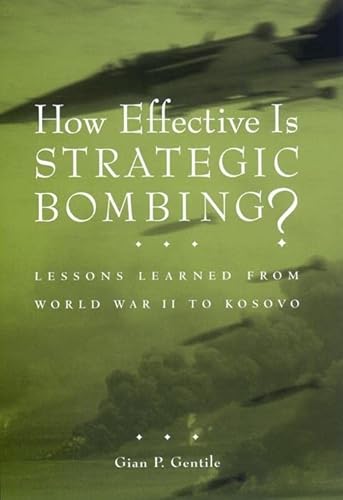
How Effective is Strategic Bombing?
by Gian P. Gentile
"Lessons Learned from World War II to Kosovo"
Popularity
3.39 / 5
* A book's popularity is determined by how it compares to all other books on this website.
Where to buy?
Buy from Amazon* If you buy this book through the link above, we may receive a small commission at no extra cost to you.
How Effective is Strategic Bombing? by Gian P. Gentile
Details
War:
World War II
Perspective:
Bombers
True Story:
Yes
Biography:
No
Region:
Europe
Page Count:
302
Published Date:
2001
ISBN13:
9780814731352
Description
Brief Summary
How Effective is Strategic Bombing? by Gian P. Gentile is a critical examination of the US Strategic Bombing Survey commissioned by President Truman after World War II. The book scrutinizes how this survey has been utilized as a vital resource and authoritative text concerning the efficacy of strategic air power during the war. Gentile re-evaluates the document to shed light on the inherent biases and conclusions that reflect an American perspective on strategic bombing. By doing so, he questions long-held beliefs surrounding the effectiveness of air power strategies, especially in the aftermath of the war.
Main Themes and Topics
The central theme of Gentile's work revolves around the reevaluation of the US Strategic Bombing Survey and its underlying assumptions. The book discusses the American conceptual approach to strategic bombing and critiques the tautological nature of the survey. Gentile delves into the philosophy and strategies of American air power, questioning the purported success and efficacy presented in the survey. A significant topic addressed is the issue of bomb damage assessment, particularly in contemporary military engagements such as those in the Balkans, which Gentile uses to support his conclusions.
Writing Style and Tone
Gian P. Gentile's writing is analytical and thought-provoking, characteristic of someone with a strong academic background in military history. His tone is critical yet scholarly, aiming to engage readers who are interested in military studies and historical reassessment. Gentile presents his arguments with clarity and precision, making complex military concepts accessible to both academic and general audiences interested in the subject.
Criticism
Some criticisms of the book might center on its dense academic writing, which could be challenging for readers not already familiar with military history or strategic studies. Additionally, Gentile's approach, which questions established narratives about World War II air power, may not resonate with those who hold traditional views on the subject. The book’s deep dive into technical and historical details might also overwhelm readers looking for a more general overview of strategic bombing's effectiveness.








